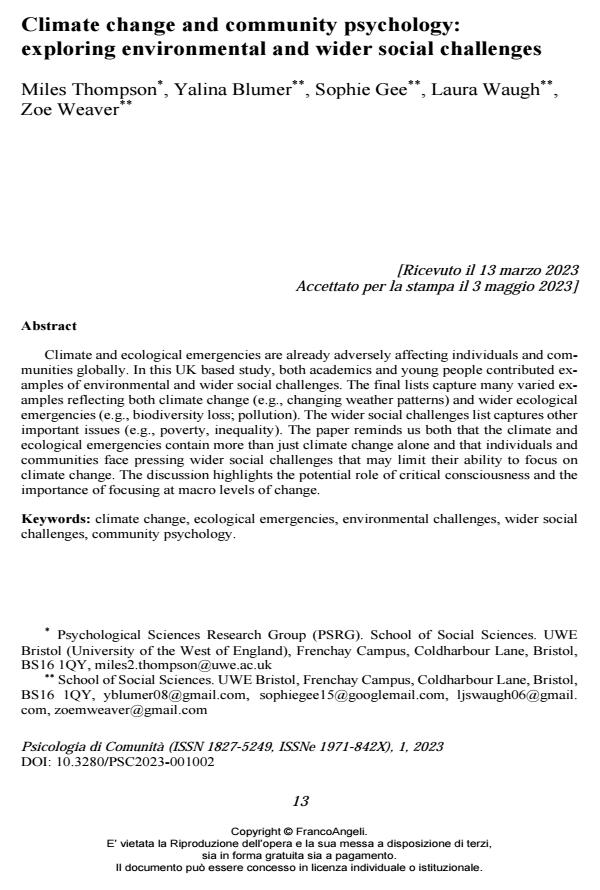Climate change and community psychology: exploring environmental and wider social challenges
Titolo Rivista PSICOLOGIA DI COMUNITA’
Autori/Curatori Miles Thompson, Yalina Blumer, Sophie Gee, Laura Waugh, Zoe Weaver
Anno di pubblicazione 2023 Fascicolo 2023/1
Lingua Italiano Numero pagine 21 P. 13-33 Dimensione file 215 KB
DOI 10.3280/PSC2023-001002
Il DOI è il codice a barre della proprietà intellettuale: per saperne di più
clicca qui
Qui sotto puoi vedere in anteprima la prima pagina di questo articolo.
Se questo articolo ti interessa, lo puoi acquistare (e scaricare in formato pdf) seguendo le facili indicazioni per acquistare il download credit. Acquista Download Credits per scaricare questo Articolo in formato PDF

FrancoAngeli è membro della Publishers International Linking Association, Inc (PILA), associazione indipendente e non profit per facilitare (attraverso i servizi tecnologici implementati da CrossRef.org) l’accesso degli studiosi ai contenuti digitali nelle pubblicazioni professionali e scientifiche.
Climate and ecological emergencies are already adversely affecting individuals and com-munities globally. In this UK based study, both academics and young people contributed ex-amples of environmental and wider social challenges. The final lists capture many varied ex-amples reflecting both climate change (e.g., changing weather patterns) and wider ecological emergencies (e.g., biodiversity loss; pollution). The wider social challenges list captures other important issues (e.g., poverty, inequality). The paper reminds us both that the climate and ecological emergencies contain more than just climate change alone and that individuals and communities face pressing wider social challenges that may limit their ability to focus on cli-mate change. The discussion highlights the potential role of critical consciousness and the im-portance of focusing at macro levels of change.
Parole chiave:climate change, ecological emergencies, environmental challenges, wider social challenges, community psychology.
- Community, Psychology and Climate Justice Davide Ziveri, Guillaume Pégon, Florentino Moreno Martín, pp.63 (ISBN:978-3-031-99222-3)
- Exploring Participant‐Generated Examples of Social Change: A Two‐Stage, Mixed Methods, Delphi Study Miles Thompson, Ben Rosser, Eleanor Stone, Holly Parker, Eleanor Harrison‐Wolff, in Journal of Community Psychology e70024/2025
DOI: 10.1002/jcop.70024 - Community, Psychology and Climate Justice Miles Thompson, Live-Anett Jønholt, Sarah Nevin, Ilhaam Selih, pp.45 (ISBN:978-3-031-99222-3)
Miles Thompson, Yalina Blumer, Sophie Gee, Laura Waugh, Zoe Weaver, Climate change and community psychology: exploring environmental and wider social challenges in "PSICOLOGIA DI COMUNITA’" 1/2023, pp 13-33, DOI: 10.3280/PSC2023-001002